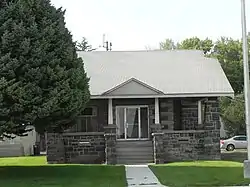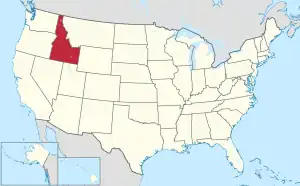Lincoln County | |
|---|---|
 | |
 Seal | |
 Location within the U.S. state of Idaho | |
 Idaho's location within the U.S. | |
| Coordinates: 42°59′N 114°08′W / 42.98°N 114.13°W | |
| Country | |
| State | |
| Founded | March 18, 1895 |
| Named for | Abraham Lincoln |
| Seat | Shoshone |
| Largest city | Shoshone |
| Area | |
| • Total | 1,206 sq mi (3,120 km2) |
| • Land | 1,201 sq mi (3,110 km2) |
| • Water | 4.5 sq mi (12 km2) 0.4% |
| Population (2020) | |
| • Total | 5,127 |
| • Density | 4.3/sq mi (1.6/km2) |
| Time zone | UTC−7 (Mountain) |
| • Summer (DST) | UTC−6 (MDT) |
| Congressional district | 2nd |
| Website | www |
Lincoln County is a county located in the U.S. state of Idaho. As of the 2020 census, the population was 5,127.[1] The county seat and largest city is Shoshone.[2] The county is named after President Abraham Lincoln.[3] The Idaho Territory was created in 1863, during the Lincoln Administration of 1861–65.
Lincoln County is included in the Hailey, ID Micropolitan Statistical Area.
Lincoln County was created by the Idaho Legislature on March 18, 1895, by a partitioning of Blaine County, which was created earlier that month by a merger of Alturas and Logan Counties. Lincoln County itself was partitioned on January 28, 1913, with a western portion becoming Gooding County and an eastern portion becoming Minidoka County. The county assumed its present borders on February 8, 1919, when a southern portion became Jerome County.[4]
Geography
According to the U.S. Census Bureau, the county has a total area of 1,206 square miles (3,120 km2), of which 1,201 square miles (3,110 km2) is land and 4.5 square miles (12 km2) (0.4%) is water.[5]
Adjacent counties
- Camas County - northwest
- Blaine County - north
- Minidoka County - east
- Jerome County - south
- Gooding County - west
Major highways
National protected area
Demographics
| Census | Pop. | Note | %± |
|---|---|---|---|
| 1900 | 1,784 | — | |
| 1910 | 12,676 | 610.5% | |
| 1920 | 3,446 | −72.8% | |
| 1930 | 3,242 | −5.9% | |
| 1940 | 4,230 | 30.5% | |
| 1950 | 4,256 | 0.6% | |
| 1960 | 3,686 | −13.4% | |
| 1970 | 3,057 | −17.1% | |
| 1980 | 3,436 | 12.4% | |
| 1990 | 3,308 | −3.7% | |
| 2000 | 4,044 | 22.2% | |
| 2010 | 5,208 | 28.8% | |
| 2020 | 5,127 | −1.6% | |
| 2021 (est.) | 5,282 | [6] | 3.0% |
| U.S. Decennial Census[7] 1790-1960[8] 1900-1990[9] 1990-2000[10] 2010-2020[11] | |||
2000 census
As of the census[12] of 2000, there were 4,044 people, 1,447 households, and 1,050 families living in the county. The population density was 3 people per square mile (1.2 people/km2). There were 1,651 housing units at an average density of 1 units per square mile (0.39 units/km2). The racial makeup of the county was 86.47% White, 0.47% Black or African American, 1.21% Native American, 0.45% Asian, 0.05% Pacific Islander, 9.42% from other races, and 1.93% from two or more races. 13.40% of the population were Hispanic or Latino of any race. 16.8% were of English, 12.4% American, 11.5% German and 8.3% Irish ancestry.
There were 1,447 households, out of which 37.70% had children under the age of 18 living with them, 61.50% were married couples living together, 5.50% had a female householder with no husband present, and 27.40% were non-families. 22.90% of all households were made up of individuals, and 10.20% had someone living alone who was 65 years of age or older. The average household size was 2.77 and the average family size was 3.27.
In the county, the population was spread out, with 30.40% under the age of 18, 9.00% from 18 to 24, 25.50% from 25 to 44, 22.00% from 45 to 64, and 13.10% who were 65 years of age or older. The median age was 34 years. For every 100 females there were 106.50 males. For every 100 females age 18 and over, there were 105.80 males.
The median income for a household in the county was $32,484, and the median income for a family was $36,792. Males had a median income of $26,576 versus $20,032 for females. The per capita income for the county was $14,257. 13.10% of the population and 10.80% of families were below the poverty line. Out of the total population, 18.30% of those under the age of 18 and 7.00% of those 65 and older were living below the poverty line.
2010 census
As of the 2010 United States Census, there were 5,208 people, 1,705 households, and 1,271 families living in the county.[13] The population density was 4.3 inhabitants per square mile (1.7/km2). There were 1,976 housing units at an average density of 1.6 units per square mile (0.62 units/km2).[14] The racial makeup of the county was 80.1% white, 0.7% American Indian, 0.4% black or African American, 0.4% Asian, 0.1% Pacific islander, 16.2% from other races, and 2.2% from two or more races. Those of Hispanic or Latino origin made up 28.3% of the population.[13] In terms of ancestry, 21.2% were German, 17.3% were English, 6.9% were Irish, and 6.1% were American.[15]
Of the 1,705 households, 43.4% had children under the age of 18 living with them, 60.8% were married couples living together, 7.1% had a female householder with no husband present, 25.5% were non-families, and 20.5% of all households were made up of individuals. The average household size was 3.03 and the average family size was 3.52. The median age was 32.0 years.[13]
The median income for a household in the county was $45,714 and the median income for a family was $50,543. Males had a median income of $37,639 versus $30,080 for females. The per capita income for the county was $19,011. About 10.9% of families and 15.3% of the population were below the poverty line, including 19.4% of those under age 18 and 25.0% of those age 65 or over.[16]
2020 census
As of the 2020 United States Census, there were 5,127 people and 1,804 households living in the county.[1][17] The population density was 4.3 inhabitants per square mile, or 4.3 inhabitants per 1.7 square kilometers.
Communities
Cities
Unincorporated community
- Hidden Valley (Extends into) Minidoka County and Jerome County
- Kimama (Extend into) Minidoka County
Politics
| Year | Republican | Democratic | Third party | |||
|---|---|---|---|---|---|---|
| No. | % | No. | % | No. | % | |
| 2020 | 1,469 | 75.68% | 414 | 21.33% | 58 | 2.99% |
| 2016 | 1,184 | 67.73% | 360 | 20.59% | 204 | 11.67% |
| 2012 | 1,141 | 68.61% | 469 | 28.20% | 53 | 3.19% |
| 2008 | 1,232 | 65.88% | 545 | 29.14% | 93 | 4.97% |
| 2004 | 1,388 | 73.99% | 466 | 24.84% | 22 | 1.17% |
| 2000 | 1,049 | 66.65% | 437 | 27.76% | 88 | 5.59% |
| 1996 | 744 | 47.63% | 478 | 30.60% | 340 | 21.77% |
| 1992 | 656 | 38.61% | 514 | 30.25% | 529 | 31.14% |
| 1988 | 918 | 60.20% | 574 | 37.64% | 33 | 2.16% |
| 1984 | 1,211 | 74.98% | 386 | 23.90% | 18 | 1.11% |
| 1980 | 1,294 | 69.12% | 462 | 24.68% | 116 | 6.20% |
| 1976 | 909 | 57.75% | 615 | 39.07% | 50 | 3.18% |
| 1972 | 1,120 | 74.37% | 313 | 20.78% | 73 | 4.85% |
| 1968 | 972 | 62.91% | 350 | 22.65% | 223 | 14.43% |
| 1964 | 969 | 61.10% | 617 | 38.90% | 0 | 0.00% |
| 1960 | 970 | 55.33% | 783 | 44.67% | 0 | 0.00% |
| 1956 | 1,069 | 61.83% | 660 | 38.17% | 0 | 0.00% |
| 1952 | 1,383 | 71.11% | 562 | 28.89% | 0 | 0.00% |
| 1948 | 851 | 52.63% | 748 | 46.26% | 18 | 1.11% |
| 1944 | 934 | 54.30% | 784 | 45.58% | 2 | 0.12% |
| 1940 | 1,009 | 53.05% | 886 | 46.58% | 7 | 0.37% |
| 1936 | 766 | 44.51% | 916 | 53.22% | 39 | 2.27% |
| 1932 | 691 | 43.51% | 869 | 54.72% | 28 | 1.76% |
| 1928 | 865 | 70.50% | 358 | 29.18% | 4 | 0.33% |
| 1924 | 692 | 54.36% | 154 | 12.10% | 427 | 33.54% |
| 1920 | 755 | 63.87% | 427 | 36.13% | 0 | 0.00% |
| 1916 | 1,121 | 48.59% | 1,084 | 46.99% | 102 | 4.42% |
| 1912 | 1,191 | 23.41% | 1,541 | 30.29% | 2,355 | 46.29% |
| 1908 | 1,310 | 54.33% | 804 | 33.35% | 297 | 12.32% |
| 1904 | 688 | 68.19% | 262 | 25.97% | 59 | 5.85% |
| 1900 | 370 | 51.03% | 355 | 48.97% | 0 | 0.00% |
See also
References
- 1 2 "Explore Census Data". data.census.gov. Retrieved May 17, 2022.
- ↑ "Find a County". National Association of Counties. Retrieved June 7, 2011.
- ↑ Gannett, Henry (1905). The Origin of Certain Place Names in the United States. U.S. Government Printing Office. p. 187.
- ↑ Goertzen, Dorine (September 20, 1962). "Lincoln County was built on plains of Snake River". Lewiston Morning Tribune. (Idaho). p. 11, section 2.
- ↑ "US Gazetteer files: 2010, 2000, and 1990". United States Census Bureau. February 12, 2011. Retrieved April 23, 2011.
- ↑ "U.S. Census Bureau QuickFacts: Lincoln County, Idaho". Census.gov. Retrieved July 20, 2022.
- ↑ "U.S. Decennial Census". United States Census Bureau. Retrieved July 1, 2014.
- ↑ "Historical Census Browser". University of Virginia Library. Retrieved July 1, 2014.
- ↑ "Population of Counties by Decennial Census: 1900 to 1990". United States Census Bureau. Retrieved July 1, 2014.
- ↑ "Census 2000 PHC-T-4. Ranking Tables for Counties: 1990 and 2000" (PDF). United States Census Bureau. Archived (PDF) from the original on March 27, 2010. Retrieved July 1, 2014.
- ↑ "State & County QuickFacts". United States Census Bureau. Archived from the original on July 17, 2011. Retrieved July 1, 2014.
- ↑ "U.S. Census website". United States Census Bureau. Retrieved January 31, 2008.
- 1 2 3 "DP-1 Profile of General Population and Housing Characteristics: 2010 Demographic Profile Data". United States Census Bureau. Archived from the original on February 13, 2020. Retrieved January 9, 2016.
- ↑ "Population, Housing Units, Area, and Density: 2010 - County". United States Census Bureau. Archived from the original on February 13, 2020. Retrieved January 9, 2016.
- ↑ "DP02 SELECTED SOCIAL CHARACTERISTICS IN THE UNITED STATES – 2006-2010 American Community Survey 5-Year Estimates". United States Census Bureau. Archived from the original on February 13, 2020. Retrieved January 9, 2016.
- ↑ "DP03 SELECTED ECONOMIC CHARACTERISTICS – 2006-2010 American Community Survey 5-Year Estimates". United States Census Bureau. Archived from the original on February 13, 2020. Retrieved January 9, 2016.
- ↑ "QuickFacts, Lincoln County, Idaho". census.gov. April 1, 2010. Archived from the original on May 17, 2022. Retrieved May 17, 2022.
- ↑ Leip, David. "Dave Leip's Atlas of U.S. Presidential Elections". uselectionatlas.org. Retrieved April 4, 2018.